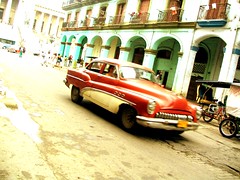 For the average American tourist – armed with nothing more than a plane ticket, a suitcase, and some travel insurance – a vacation to Cuba is still not an option. The trade embargo that the US imposed against Cuba in the 1960s includes the money that would be spent in casual travel to the country. Though many Americans risk heavy fines and criminal charges to travel to there, the only way a US citizen can officially visit Cuba is with a valid license from the U.S. Department of the Treasury.
For the average American tourist – armed with nothing more than a plane ticket, a suitcase, and some travel insurance – a vacation to Cuba is still not an option. The trade embargo that the US imposed against Cuba in the 1960s includes the money that would be spent in casual travel to the country. Though many Americans risk heavy fines and criminal charges to travel to there, the only way a US citizen can officially visit Cuba is with a valid license from the U.S. Department of the Treasury.
General licenses allow their holders to travel to Cuba and spend only the amount of money necessary to travel. Travelers that may be eligible for general licenses are:
- U.S. persons with close relatives in Cuba who wish to visit their family
- Journalists and news crews can travel for the purpose of journalistic activities
- Official government travelers on official business
- Members of international organizations of which the United States is also a member, that are traveling on official business
- Full-time researchers traveling for academic research
- Full-time professionals traveling for a meeting or conference
Those who are ineligible for general licenses might be able to apply for a specific license. There are several categories of specific licenses.
Specific Licenses may be granted to those wishing to visit close relatives in Cuba who are non-Cuban nationals. These licenses must be applied for directly to the Office of Foreign Assets Control.
There are also specific licenses for educational institutions, allowing students and employees of US institutions trips to Cuba relating to academic studies.
There are a number of traveler categories that fall under this license:
- Undergraduate or graduate students that are participating in an educational program
- People doing non-commercial research in Cuba as part of their pursuit of a degree
- Teachers regularly employed at a US institution who will be participating in an educational program
- Cuban scholars teaching or engaging in a program at a US institution
- Full-time employees of a US institution preparing for an academic program
In addition to specific licenses for individuals working for religious organizations, there are some other travelers that may be granted specific licenses on a case-by-case basis.
- Those engaged in humanitarian or human rights projects
- Free-lance journalists with a proven publication history
- Professionals doing research or attending a meeting that do not necessarily meet the requirements of the general license.
- Those engaged in religious activities that are not authorized by a religious organization
- Performers or athletes engaged in a public performance, competition, or exhibition
- Private foundations or research/educational institutions that collect information related to Cuba for non-commercial purposes.
- Those engaged in legal activities relating to licensed exportation
Over the years, the regulations restricting U.S. citizens’ travel to Cuba have changed, so even if you feel like you may meet one of the license categories, it’s always a good idea to check with the Office of Foreign Assets Control before you buy that ticket, pack that bag, or get that travel insurance policy.
